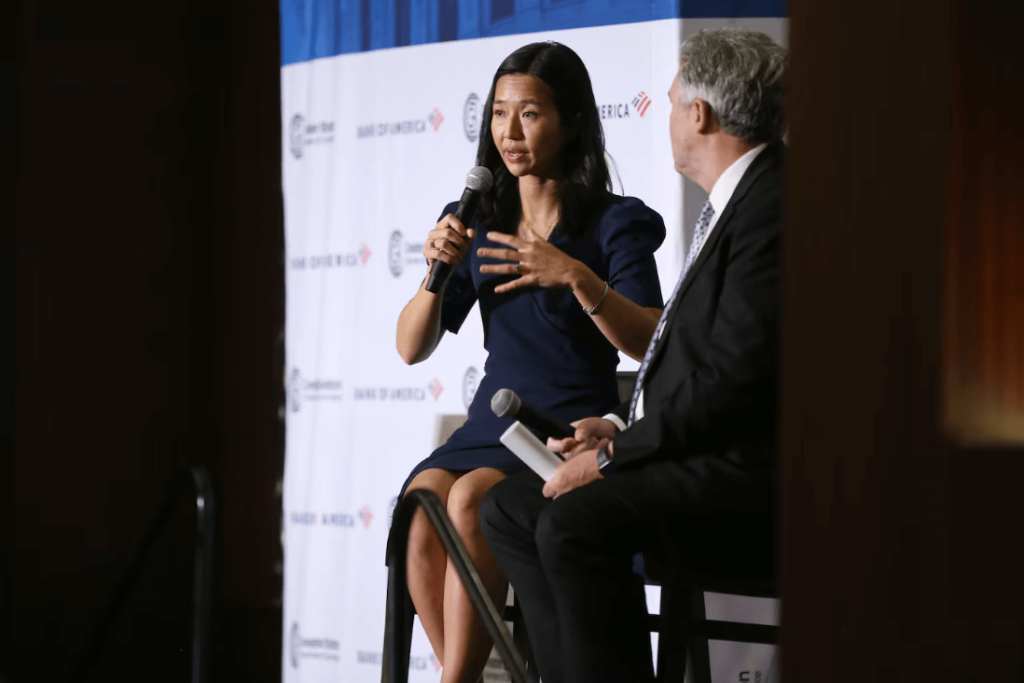【中美创新时报2024 年 10 月 22 日编译讯】(记者温友平编译)随着波士顿市下一轮税收法案的截止日期临近,波士顿商界领袖和吴弭市政府周一仍就市长提出的提高商业地产税率和减轻房主和房东可能大幅加税的有争议的计划存在分歧。对此,《波士顿环球报》记者凯瑟琳·卡洛克(Catherine Carlock)作了下述报道。
围绕这一问题的长期紧张局势在周末公开化,双方的“妥协”提案看似接近,但在一个关键问题上相差甚远——该市税收负担的多少份额应该由商业建筑而不是住宅承担——僵局仍在继续。
在市政厅、州议会和商界就如何在办公楼估值下滑的情况下合理平衡房产税进行了七个月的谈判后,四个主要商业团体于周五提出了一个折衷方案:他们支持将商业税率暂时提高 6.5 个百分点,即住宅税率的 181.5%,并放弃削减该市 46 亿美元预算的坚持——他们认为这是一个重大让步,尤其是考虑到该市预算比去年同期增长了 8%。
然后在周五晚上 5:18,市政府间关系主管克莱尔·凯利 (Clare Kelly) 给商业财团和波士顿参议院代表团发了一封电子邮件,其中包含一个细微的变化:商业税上限为 182%——比商界领袖提出的高出半个百分点。
根据州数据,波士顿的平均单户住宅每年支付超过 6,000 美元的房产税。不同的提案意味着明年住宅税将增加 8.5% 或 9%。据该市称,对于普通纳税人来说,两个提案之间的差额约为 21 美元。
但这一差距——以及沟通的方式——表明吴和商界领袖之间的关系充其量也只是冷淡。
相关:爱德曼:21 美元阻碍了达成房地产税协议
商界团体不愿进一步行动。房地产贸易集团 NAIOP Massachusetts 的首席执行官 Tamara Small 周一表示,上周提出的 181.5% 的提议是“最佳和最终报价”。
“考虑到商业房地产面临的危机,目前不支持超过这个百分比,”她说。
吴对此持乐观态度,“希望我们能很快达成最终解决方案。”
“我们越来越接近从根本上认识到,企业和居民相互依赖,我们的经济才能繁荣,”吴说。
他们可能有机会亲自讨论这个问题。
吴周一前往多伦多参加大波士顿商会一年一度的城市间访问,商界领袖们将访问其他社区,建立联系网并了解其他城市的运作方式。商会首席执行官吉姆·鲁尼主持了一场由吴和多伦多市长奥利维亚·周参加的小组讨论。鲁尼表示,他和吴将于周二讨论房地产税问题。
但任何协议最终都必须在波士顿和灯塔山通过审查。由于波士顿已经对商业地产征收最高允许税率,进一步提高这些税率需要市议会和州立法者通过地方自治请愿书。
这使得商界领袖在必要时可以在 Beacon Hill 上反对吴的计划,尽管众议院已经批准了她的提案版本,但参议院议长凯伦·斯皮尔卡 (Karen Spilka) 对此持怀疑态度。这种怀疑态度似乎还在继续;斯皮尔卡的办公室在周日的一份声明中表示,她将站在商界一边,称“如果没有商界的全力支持,最终法案很难在参议院获得通过。”
吴的下一步行动尚不清楚。周一她没有透露她是否会同意 181.5%,还是坚持 182%,她说她需要先与市和州领导、居民以及“到目前为止一直参与其中的所有人”交谈。
“我们正在讨论要求城市中的每个家庭平均再支付 21 美元,以便在商业方面进一步减少税收,”吴说。“对于许多企业来说……税率的变化在他们的预算中并不明显。但对家庭来说,21 美元确实能带来改变。”
《环球报》记者 Larry Edelman 对本报告亦有贡献。
题图:波士顿市长 吴弭(Michelle Wu )和大波士顿商会首席执行官 Jim Rooney 在 2022 年的商会活动上。Jonathan Wiggs/Globe 工作人员
附原英文报道:
With compromise near, Wu and business leaders dig back in on Boston tax plan
After months of negotiations, dueling “compromise” proposals remain just far enough apart on one key point.
By Catherine Carlock Globe Staff,Updated October 21, 2024
Boston Mayor Michelle Wu and Greater Boston Chamber of Commerce chief executive Jim Rooney at a Chamber event in 2022.Jonathan Wiggs/Globe Staff
With a deadline fast approaching to send out the city’s next round of tax bills, Boston business leaders and the Wu administration remained at odds Monday over the mayor’s contentious plan to hike commercial property tax rates and ease a sharp potential hike on homeowners and landlords.
Long-simmering tensions over the issue broke into the open over the weekend, with dueling “compromise” proposals that appear close but are just far enough apart on a key issue — what share of the city’s tax burden should be born by commercial buildings instead of residential — that the impasse continued.
After seven months of talks among City Hall, the state Legislature, and the business community over how to properly balance property taxes amid slumping office building valuations, four key business groups on Friday proposed a compromise: They’d support a temporary increase in commercial tax rates of 6.5 percentage points above current levels, or 181.5 percent of residential rates, and back off their insistence on cuts to the city’s $4.6 billion budget — a move they considered a substantial concession, especially given the city budget’s 8 percent increase from a year prior.
Then on Friday evening, at 5:18 p.m., city intergovernmental relations director, Clare Kelly, emailed the business consortium and Boston’s Senate delegation with a slight change: a commercial tax cap of 182 percent — half a percentage point more than business leaders had offered.
The average single-family home in Boston pays more than $6,000 a year in property taxes, according to state data. The different proposals would mean a residential tax increase of 8.5 or 9 percent next year. For the typical taxpayer, the difference between the two proposals amounts to about $21, according to the city.
But the gap — and the way it was communicated — signals that relations between Wu and business leaders remain frosty at best.
Related: Edelman: $21 stands in the way of a deal on property taxes
Business groups are disinclined to move further. Tamara Small, chief executive of real estate trade group NAIOP Massachusetts, said Monday that last week’s proposal of 181.5 percent was a “best and final offer.”
“Going beyond that percentage at this time would not be supported given the crisis facing commercial real estate,” she said.
For her part, Wu was upbeat, “hopeful that we will be able to reach a final resolution soon.”
“We are getting closer to a fundamental recognition that businesses and residents rely on each other for our economy to thrive,” Wu said.
They may have had a chance to hash it out in person.
Wu on Monday traveled to Toronto to attend the Greater Boston Chamber of Commerce’s annual City-to-City visit, where business leaders visit other communities to network and learn about how other cities operate. Chamber chief executive Jim Rooney moderated a panel featuring Wu and Mayor Olivia Chow of Toronto. Rooney said he and Wu are due to discuss the property tax issue on Tuesday.
But any deal will ultimately have to pass muster back in Boston and on Beacon Hill too. Since Boston already taxes commercial property at the maximum-allowable rate, increasing those rates further requires a home rule petition passed by both the City Council and state lawmakers.
That gives business leaders leverage to fight Wu’s plan on Beacon Hill if necessary, and while the House has already approved a version of her proposal, Senate President Karen Spilka has been far more skeptical. That skepticism appears to continue; in a statement Sunday Spilka’s office indicated she would side with the business cohort on the issue, saying “it will be difficult to get a final bill through the Senate without the full support of the business community.”
Wu’s next move is not yet clear. She wouldn’t say on Monday whether she’d agree to 181.5 percent, or stick with 182 percent, saying she’d need to speak first with city and state leaders, residents, and “all those who have been engaged up until this point.”
“We’re talking about asking every family in the city, on average, to shell out another $21 so that there can be additional decreases on the commercial side,” Wu said. “For many businesses . . . (a) change in the tax rate is not noticeable in their budgets. But for families, yes, $21 makes a difference.”
Larry Edelman of the Globe Staff contributed to this report.
